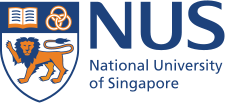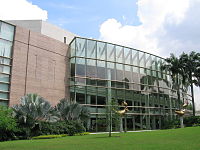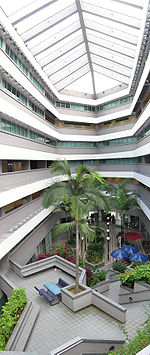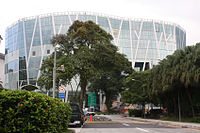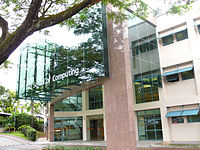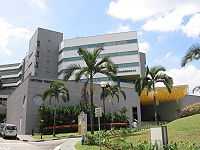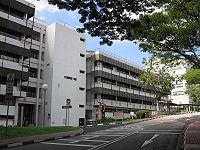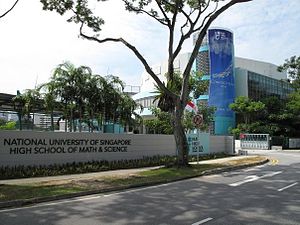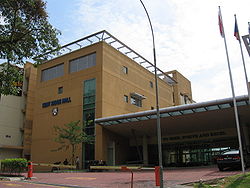- National University of Singapore
-
National University of Singapore 
Coat of Arms of NUSEstablished 1905 Type Autonomous Endowment S$1.688 billion[1] Chancellor President Tony Tan President Professor Tan Chorh Chuan Academic staff 2,402[2] Undergraduates 26,418[2]
Graduates = 10,548[2]Location Singapore, Singapore
1°17′44″N 103°46′36″E / 1.29556°N 103.77667°ECoordinates: 1°17′44″N 103°46′36″E / 1.29556°N 103.77667°EColors Orange and Blue Affiliations IARU, APRU, Universitas 21, GEM4, AUN, NUS High School of Mathematics and Science Website www.nus.edu.sg Vision = A leading global university centred in Asia, influencing the future The National University of Singapore (Abbreviation: NUS; Malay: Universiti Kebangsaan Singapura; Chinese: 新加坡国立大学; pinyin: Xīnjiāpō Guólì Dàxué; Abbreviated 国大; Tamil: சிங்கப்பூர் தேசியப் பல்கலைக்கழகம், Ciṅkappūr Tēciyap Palkalaikkaḻakam ?) is Singapore's oldest university. It is the largest university in the country in terms of student enrollment and curriculum offered.
The university's main campus is located in southwest Singapore at Kent Ridge, with an area of approximately 1.5 km2 (0.58 sq mi). The Bukit Timah campus houses the Faculty of Law, Lee Kuan Yew School of Public Policy and research institutes, while the Duke-NUS Graduate Medical School Singapore is located at the Outram campus.
The former British Prime Minister Tony Blair has recently named NUS as the headquarters of his Asian Faith and Globalization Initiative together with Durham University in the UK and Yale University in the USA to deliver an exclusive programme in partnership with Tony Blair Faith Foundation.[3]
The university is considered to be one of the most prestigious universities in Asia.[4] In 2011, NUS was ranked 28th in the world and 3rd in Asia by the QS World University Rankings[5].
History
Evolution of the University of Malaya 
Beginnings
In September 1904, Tan Jiak Kim led a group of representatives of the Chinese and other non-European communities, and petitioned the Governor of the Straits Settlements, Sir John Anderson, to establish a medical school in Singapore. Tan, who was the first president of the Straits Chinese British Association, managed to raise $87,077, of which the largest amount of $12,000 came from himself. On 3 July 1905, the medical school was founded, and was known as the Straits Settlements and Federated Malay States Government Medical School.
In 1912, the medical school received an endowment of $120,000 from the King Edward VII Memorial Fund, started by Dr Lim Boon Keng. Subsequently on 18 November 1913, the name of the school was changed to the King Edward VII Medical School. In 1921, it was again changed to the King Edward VII College of Medicine to reflect its academic status.
In 1928,[6] Raffles College was established to promote arts and social sciences at tertiary level for Malayan students.
Establishment of the university
Two decades later, Raffles College was merged with the King Edward VII College of Medicine to form the University of Malaya on 8 October 1949. The two institutions were merged to provide for the higher education needs of the Federation of Malaya and Singapore.
The growth of UM was very rapid during the first decade of its establishment and resulted in the setting up of two autonomous divisions in 1959, one located in Singapore and the other in Kuala Lumpur.
In 1960, the governments of then Federation of Malaya and Singapore indicated their desire to change the status of the divisions into that of a national university. Legislation was passed in 1961 establishing the former Kuala Lumpur division as the University of Malaya while the Singapore division was renamed the University of Singapore on 1 January 1962.
Present form
The National University of Singapore was formed with the merger of the University of Singapore and Nanyang University in 1980. This was done in part due to the government's desire to pool the two institutions' resources into a single, stronger entity, and promote English as Singapore's only main language. The original crest of Nanyang University with three intertwined rings was incorporated into the new coat-of-arms of NUS.[7]
Today, the National University of Singapore has 16 faculties and schools across three campus locations in Singapore – Kent Ridge, Bukit Timah and Outram – and provides a broad-based curriculum underscored by multi-disciplinary courses and cross-faculty enrichment.[8]
Education
NUS has a semester-based modular system for conducting courses. It adopts features of the British system, such as small group teaching (tutorials) and the American system (course credits). Students may transfer between courses within their first two semesters, enroll in cross-faculty modules or take up electives from different faculties (compulsory for most degrees). Other cross-disciplinary initiatives study programmes include double-degree undergraduate degrees in Arts & Social Sciences and Engineering; Arts & Social Sciences and Law; Business and Engineering; and Business and Law.
NUS has 16 faculties and schools, including a music conservatory. Currently, it has seven overseas colleges at major entrepreneurial hubs in Shanghai and Beijing (China), Israel, India, Stockholm (Sweden), Silicon Valley and Bio Valley (US).[9]
Faculties/Schools
Arts and Social Sciences
FASS majors is organised into three divisions – Asian Studies, Humanities and Social Sciences – under which 15 departments and programmes are grouped. It is also home to the Office of Programmes which offers four multidisciplinary programmes and five minor Programmes of study, and the Centre for Language Studies which teaches 12 different languages.[10]
Asian Studies carry a range of majors including
- Chinese Language
- Chinese Studies
- Japanese Studies
- Malay Studies
- South Asian Studies
- Southeast Asian Studies;
Humanities majors are
- English Language
- English Literature
- History
- Philosophy
- Theatre Studies;
Social Sciences varies from
- Communications & New Media
- Economics
- Geography
- Political Science
- Psychology
- Social Work
- Sociology;
European Studies is currently the only cross-departmental subject available.[11]
The faculty also offers Minor programmes (for both FASS and non-FASS undergraduates) in China Studies, American Studies, European Studies, Cultural Studies, Gender Studies, Religious Studies, Science/Technology and Society Studies. The Centre for Language Studies, which is part of FASS, offers introductory, intermediate and advanced courses on the Arabic, Chinese, French, German, Hindi, Indonesian, Japanese, Korean, Malay, Thai and Vietnamese languages. Graduate academic programmes are offered by all departments.[10]
Business School
Main article: NUS Business SchoolNUS Business School was founded as the Department of Business Administration in 1965. It has six departments: Accounting, Strategy and Policy, Decision Sciences, Finance, Management and Organization, and Marketing.[12] Collectively, the departments offer classes in the Bachelor of Business Administration (BBA) and Bachelor of Business Administration (Accountancy) [BBA(Acc)] Programmes.
Graduate programmes offered include the Master of Business Administration (MBA), NUS MBA Double Degree (conducted jointly with Peking University), UCLA-NUS Executive MBA Programme, Asia-Pacific Executive MBA (English and Chinese), S3 Asia MBA (conducted jointly with Fudan University and Korea University).[13]
Computing
Main article: School of ComputingThe School of Computing (SoC), established in 1998,, has two departments – Computer Science and Information Systems. The department of Computer Science offers three undergraduate degree programmes – Computer Science, Communications and Media, and Computational Biology.[14] The department of Information Systems offers five undergraduate programmes – Computing in Information Systems, Computing in Electronic Commerce, Concurrent Degree Programme that combines a Bachelor of Computing (in Information Systems) (Honours) from NUS and a Master of Philosophy (Management) from Cambridge University, Concurrent Degree Programme that combines a Bachelor of Computing (in Information Systems) (Honours) from NUS School of Computing and a Master of Science (Management) from the NUS School of Business, as well as a Double Degree Programme, with a Bachelor of Computing (in Information Systems) (Honours) from NUS School of Computing, and a Bachelor of Business Administration / Business Administration (Accountancy) from the NUS School of Business.[15]
Dentistry
The Faculty of Dentistry had its early beginnings in 1929 as a Department of Dentistry within the King Edward VII College of Medicine. It was the first dental school to be established in a British colony in the east.[16] The faculty conducts a four-year dental course leading to the Bachelor of Dental Surgery (BDS) degree. The undergraduate programme comprises two pre-clinical (first two years) and two clinical years. The Faculty of Dentistry is organised into 3 academic departments covering the disciplines of Oral, and Maxillofacial Surgery, Preventive Dentistry and Restorative Dentistry. Dental education is delivered through comprehensive didatic and clinical sessions. The broad experience and specialisation of the academic staff combine to provide the dental undergraduate with the requisite skills for general practice.[17]
Design and Environment
The School of Design and Environment (SDE) comprises three departments: Architecture, Building and Real Estate and a Division of Industrial Design.[18] Degree courses in building and estate management were first offered in 1969 in the then Department of Building and Estate Management. This was subsequently changed to the School of Building and Real Estate. In June 2000 the Faculty of Architecture, Building and Real Estate changed its name to the School of Design & Environment. As a result of this change, Building and Real Estate were established as separate departments.
SDE offers four undergraduate programmes: Bachelor of Arts (Architecture) (Hons), Bachelor of Arts (Industrial Design) (Hons), Bachelor of Science (Project and Facilities Management) (Hons), and Bachelor of Science (Real Estate) (Hons). Graduate programmes offer specialisations in architecture, building and real estate including scientific aspects of environmental control, building operations, project management and property management.[19]
Engineering
The Faculty of Engineering (FOE) was launched in 1968. It is the largest faculty in the university. FOE offers undergraduate and graduate degree programmes. The 10 undergraduate programmes include fields such as Chemical, Civil, Electrical, Computer Engineering, Engineering Science, Environmental, Mechanical, Industrial and Systems Engineering, Bioengineering, and Materials Science & Engineering. The faculty also offers part-time undergraduate courses for polytechnic graduates and working professionals leading to the Bachelor of Technology. Graduate programmes include Master of Engineering, Master of Science, NUS-UIUC Master of Science (Chemical Engineering), and Doctor of Philosophy (PhD). [20]
FOE consists of departments and divisions: Bioengineering; Chemical & Biomolecular Engineering; Civil & Environmental Engineering; Electrical & Computer Engineering; Engineering Science Programme; Industrial & Systems Engineering; Materials Science & Engineering, Mechanical Engineering, and division of Engineering and Technology Management.[21]
Law
Main article: Faculty of LawThe law school was first established as a Department of Law in the then University of Malaya in 1956. The first law students were admitted to the Bukit Timah campus of the university the following year. In 1977, the faculty shifted to the Kent Ridge campus, but in 2006 it relocated back to the Bukit Timah site.
Apart from the traditional LLB which runs for four years, the law school also offers double honours degrees in Business Administration & Law, Economics & Law,[22] Law & Life Sciences,[23] and a concurrent degree program in Law & Public Policy.[24] For graduate students, the law school offers coursework LLM specializations[25] in areas such as Corporate and Financial Services Law, Intellectual Property & Technology Law, International & Comparative Law, Maritime Law and Asian Legal Studies.
Students seeking a global legal qualification can opt for the dual degree programme known informally as NYU@NUS which is a collaboration between NUS and New York University School of Law. The programme commences in Singapore in May, with NYU faculty flying to Singapore for intensive classes, continues with the NUS semesters, and concludes in New York City with a programme designed to complement preparation to sit the New York Bar Exam. Students who want to combine their NUS degree with significant time in China should consider the LL.M. in International Business Law, which takes place in Singapore and Shanghai and is offered in partnership with the East China University of Political Science and Law. There is also and a PhD programme that’s available for graduate students. [26]
Yong Loo Lin School of Medicine
The Yong Loo Lin School of Medicine (杨潞龄医学院) was first established as the Straits Settlements and Federated Malay States Government Medical School in 1905. The School comprises departments such as the Alice Lee Centre for Nursing Studies, Anaesthesia, Anatomy, Biochemistry, Diagnostic Radiology, Epidemiology and Public Health, Medicine, Microbiology, Obstetrics & Gynaecology, Ophthalmology, Orthopaedic Surgery, Otolaryngology, Paediatrics, Pathology, Pharmacology, Physiology, Psychological Medicine, and Surgery. The School uses the British undergraduate medical system, offering a full-time undergraduate programme leading to the Bachelor of Medicine and Bachelor of Surgery (MBBS). For Nursing, the Bachelor of Science (Nursing) (conducted by the Alice Lee Centre for Nursing Studies) is offered. In 2011, the School is ranked as the top medical school in Asia and 18th in the world overall by the QS World University Rankings by Subject (Medicine).[27]
Graduate programmes include:
- Master of Medicine specialises in Anaesthesiology, Diagnostic Radiology, Emergency Medicine, Family Medicine, Internal Medicine, Obestetrics & Gynaecology, Occupational Medicine, Ophthalomology, Orthopaedic Surgery, Otorhinolaryngology Paediatric Medicine, Psychiatry, Public Health, and Surgery. The MMed is often taken at the same time as the MRCP(UK), offered by the British Royal Colleges.
- Research-oriented MSc or PhD degree programmes to train biomedical scientists
- MBBS-PhD Programme to train medical-scientists for academia and industry
- Part-time Graduate Diploma programmes in Dermatology, Family Medicine, Geriatric Medicine and Occupational Medicine
- Master of Nursing
Duke-NUS Graduate Medical School Singapore
Main article: Duke-NUS Graduate Medical School SingaporeThe Duke-NUS Graduate Medical School Singapore Duke-NUS is an innovative collaboration between Duke University in North Carolina, United States and the National University of Singapore. It follows the American model of post-baccalaureate medical education. Students begin their medical studies after earning a bachelor’s degree. In this way, Duke-NUS is able to offer an innovative opportunity for students with the potential to excel in the field of medicine and biomedical sciences. [28]
The school’s curriculum is based on that of Duke University’s School of Medicine: basic sciences (first year); clinical rotations (second year) and independent scholarship and research (third year). Upon successfully completing the course of study and fulfilling all requirements after their fourth year, students will be awarded a Joint Doctor of Medicine (M.D) degree from Duke University and the National University of Singapore.
Duke-NUS also offers an M.D./PhD programme for students who are committed to intensive research-oriented clinical practice careers, combining biomedical research with the practice of clinical medicine. All MD/PhD candidates will complete the first two years of the MD programme. In lieu of their third year, candidates will begin the PhD programme. The PhD typically takes four years to complete, but timing will depend on the student’s area of research. After completing their PhD, students will return to the MD programme to complete their final year. It is estimated that it will take seven years to complete an MD/PhD at Duke-NUS. [29] Students, who are admitted, will be offered a full scholarship for the PhD component as well as for the remaining tuition required to complete their M.D. training.
A five-year PhD degree study in Integrated Biology and Medicine, which incorporates key aspects of Duke and NUS graduate programmes, is also available for students wishing to develop a successful career in biomedical research.
Science
Main article: Faculty of ScienceThe Faculty of Science (FOS) comprises the departments of Biological Sciences, Chemistry, Mathematics, Pharmacy, Physics, and Statistics & Applied Probability.
The faculty offers three undergraduate degree programmes:
- Bachelor of Science/Bachelor of Science (Honours) with majors in:
Applied Mathematics, Chemistry, Computational Biology, Life Sciences, Life Sciences (with specialisation in Environmental Biology), Life Sciences (with specialisation in Biomedical Science), Life Sciences (with specialisation in Molecular and Cell Biology), Mathematics, Physics, Physics (with specialisation in Astrophysics), Physics (with specialisation in Physics in Technology),Quantitative Finance, Statistics, Statistics (with specialisation in Biostatistics), Statistics (with specialisation in Finance and Business Statistics).
- Bachelor of Applied Science/Bachelor of Applied Science (Honours) with majors in: Applied Chemistry and Food Science & Technology
- Bachelor of Science (Pharmacy)/Bachelor of Science (Pharmacy) (Honours)
The faculty also offers a spread of minors, multidisciplinary programmes and special programmes for the educational broadening and enhancement of the students.
Lee Kuan Yew School of Public Policy
Main article: Lee Kuan Yew School of Public PolicyThe Lee Kuan Yew School of Public Policy (LKYSPP) (李光耀公共政策学院) was formally established in 2004 as an autonomous graduate school of the National University of Singapore. Although the School was formally launched in 2004, it inherited NUS' Public Policy Programme, which was established in 1992 in partnership with Harvard University’s John F Kennedy School of Government.
LKYSPP offers three master degree programmes:
- Master in Public Policy
- Master in Public Administration
- Master in Public Management
NUS Graduate School for Integrative Sciences and Engineering
NUS Graduate School for Integrative Sciences and Engineering (NGS) was established in 2003. The principal purpose of NGS is to promote integrative PhD research encompassing both laboratory work and coursework programmes which not only transcend traditional subject boundaries but also provides students with a depth of experience about science and the way it is carried out. [30]
Students admitted to NGS are invited to apply for the A*STAR Pre-Graduate Scholarship. [31]
NGS’ PhD programmes are firmly anchored in cross-disciplinary research. It offers a spectrum of research areas, spanning science, engineering, related aspects of medicine, and interactive & digital media. NGS also offers the following PhD degree programmes. [32] • Joint NUS-Imperial College Phd Programme • NUS PhD-MBA
University Scholars Programme
Main article: University Scholars ProgrammeThe University Scholars Programme (USP) aims to develop the intellectual, leadership, and personal potential of promising students. Students in the Programme graduate with an honours degree from their faculty if they meet the minimum requirements by the home department or school and a certificate that recognizes them as University Scholars having participated in the programme. USP students are scholars in the sense that they love learning, and though many may also be awarded financial aid in the form of scholarships or studentships.
USP is an honours programme where students are concurrently enrolled in one of six faculties or schools – Arts and Social Sciences, Business, Computing, Design and Environment, Engineering, and Science. The students do 30% of their academic work with USP, and 70% in their home faculty or school where they do their majors. USP classes are taught in seminar style, with class sizes ranging from 10 to 35 so as to allow maximum interaction between professors and students. [33] USP modules focus on critical thinking, analysis and interdisciplinary thought. The programme emphasizes students' ability to communicate and, through analysis, make connections across diverse fields.
Starting from August 2011, this ten-year-old programme includes a residential component where USP students live and learn together in the new USP residential college in NUS's University Town. All USP students will stay at the USP residential college in Year One and a second year over the course of their studies. Entry to the programme is highly competitive. Application is by transcript, essay, and interview with our professors and alumni. Students are admitted based on their academic potential and co-curricular achievements, together with their passion, motivation, and curiosity. [34]
Yong Siew Toh Conservatory of Music
The Yong Siew Toh Conservatory of Music (YSTCM) (杨秀桃音乐学院) is a collaboration between NUS and the Peabody Institute of Johns Hopkins University. Singapore’s first conservatory of music, YSTCM was founded as the Singapore Conservatory of Music in 2001. The School was renamed Yong Siew Toh Conservatory of Music in recognition of a gift from the family of the late Dr Yong Loo Lin in memory of his daughter.
The Conservatory presently offers a Bachelor of Music (Honours) degree, with majors in Performance (Piano and Orchestral Instruments) and Composition. This is a four-year full-time music degree programme with an emphasis on music performance and music academics.
Residential Colleges
NUS University Town
The NUS University Town (UTown) opened its doors in August 2011. Located across the NUS Kent Ridge campus, this is where some 2,400 undergraduate students, 1,700 graduate students and 1,000 researchers will work, live, and learn in close proximity. There are two residential colleges (Cinnamon and Tembusu Colleges), an Education Resource Centre and a Graduate Residence. When fully completed, there will be another two residential colleges for undergraduate students. [35]
Cinnamon College
Cinnamon College houses the University Scholars Programme. The USP residential college community is set to provide a stimulating environment for intellectual and personal growth, and the USP experience will be intensely reinforced through the integration of curriculum, learning-beyond–the-classroom activities, and residential programmes. The USP residential college will house 600 students and contain the administrative and faculty offices for USP and teaching classrooms.
USP students will take modules at the college and follow the current USP curriculum. They will be required to take eight multidisciplinary modules specially designed for USP students, including the Writing and Critical Thinking module and University Scholars Seminars. Students will have various options to fulfill their USP advanced curriculum requirements that include individual research with faculty mentors, and industrial and entrepreneurial attachments. Students also get to participate in overseas programmes and exchanges with some of the best universities in the world. They will be part of a closely knitted community and network of USP alums, faculty, staff and students. [36]
Tembusu College
Tembusu College is one of the first two Residential Colleges in University Town, a new extension to the main NUS campus at Kent Ridge. Tembusu houses mainly undergraduates, in addition to resident faculty, distinguished visiting scholars, and a few graduate fellows. Freshmen (matriculating first-year students) enrolling in any NUS faculty or programme apply to the College at the same time they apply to NUS. Entry is competitive (an essay-based application followed by an interview) as only 200-230 students can be enrolled in any given year. Some students from non-modular faculties (whose course requirements may be reduced or waived) and students from overseas exchange programmes add to the residential mix. Students from any NUS faculty are eligible to apply. [37]
The College offers five multi-disciplinary modules fulfilling the "University-Level Requirements" (2 General Education modules, 2 Breadth modules, and 1 Singapore Studies module) which most NUS undergraduates must read to graduate. Students read the rest of their modules in their home faculties. A University Town Residential Programme Certificate is issued to eligible students along with the regular degree scroll. Students from non-modular faculties (i.e. Law, Medicine, and Dentistry) also belong to the College, but with course-work tailored to their specific programmes. The Rector of Tembusu College is Singapore's Ambassador-at-Large and former U.N. Ambassador Prof. Tommy Koh, who is also the former Dean of the NUS Faculty of Law.
Teaching centres
Centre for Development of Teaching and Learning
The Centre for Development of Teaching and Learning (CDTL) was first established in 1984 as the Centre for Educational Technology (CET). It was renamed to CDTL in 1996. The Centre oversees functions such as:
- Facilitating informed reflection among faculty on [38]:
- concepts of teaching, learning, and university education, and
- teaching practices that are consistent with these concepts;
- encouraging and spearheading educational innovations and initiatives;
- conducting research on educational philosophy, pedagogical theory, and educational practices;
- assisting University administration in the formulation of educational policies in matters such as teacher appraisal, peer review, selecting outstanding educators, student feedback and student assessment;
- developing and implementing teacher education programmes for faculty and teaching assistants;
- providing educational consultation and assistance to faculty; and
- exploring and promoting pedagogically sound innovative applications of instructional technology to teaching and learning, in collaboration with CIT.
Centre for Instructional Technology
The Centre for Instructional Technology (CIT) was formed in 1999 to drive the use of technology in teaching and learning at NUS. It provides for the exploration, development and application of digital and audio-visual technologies to support and enhance teaching and learning. This is done through the NUS-developed Integrated Virtual Learning Environment and by developing new applications/services and incorporating multimedia content in courses for academia. [39]
Centre for English Language Communication
The Centre for English Language Communication (CELC) was established in 1979 as the English Language Proficiency Unit (ELPU). It is a non-faculty teaching department in the National University of Singapore. CELC focuses on four areas:
- Developing students' English Language Skills;
- Enhancing students' communication skills;
- Providing training in English for Academic purposes; and
- Researching issues related to language teaching and learning.
Institute of Systems Science
A specialty training institute of NUS, the Institute of Systems Science (ISS) offers professional information technology continuing education to managers and IT practitioners. ISS is a life long learning centre for strategic IT management, software technology, and knowledge engineering. ISS offers postgraduate degree programs, professional development short courses and certification training programs such as the Certified Information Technology Project Manager (CITPM) course. ISS is also a research center in on-line education – its ISS Virtual Institute offers e-learning courses in IT Security and Object Oriented Analysis & Design.
NUS Extension
NUS Extension is the continuing education arm of NUS. It offers a comprehensive suite of courses in the following learning platforms:
- Professional and Management (Staying Relevant)
- Enterprise Leadership (Cultivating Leaders)
- Entrepreneurship Development (Nurturing Entrepreneurs)
- Personal Enrichment (Enhancing the Individual)
In addition to courses for open enrolment, NUS Extension offers training programmes that are specially tailored to meet the unique needs of each individual organisation. [40]
NUS High School of Mathematics and Science
Main article: NUS High School of Mathematics and ScienceNUS High School of Mathematics and Science is a school specializing in math and science, and provides secondary and pre-tertiary education to many students with an inclination to these fields. Being an independent department of NUS, NUS High School students are instructed in the modular system, with a curriculum accredited by NUS, and have access to certain NUS resources. Also, all NUS High School students have the privilege of electing to read any NUS modules from three faculties: Faculty of Arts and Social Sciences, Faculty of Engineering and Faculty of Science before matriculation as long as they have the necessary foundation knowledge, as opposed to students of other secondary institutions who can only read one or two modules at best. The campus is also part of the NUS fibre optic network with an underground extension linking it to the main network.
Research
Strategic research initiatives to help the university achieve its goal of knowledge creation include:
- Leveraging on available expertise to establish a base of research across a broad range of disciplines
- Building peaks of research excellence
- Growing global research links
- Forging strong links between research and graduate education
Among the major research focuses at NUS are biomedical and life sciences, physical sciences, engineering, nanoscience and nanotechnology, materials science and engineering, infocommunication and infotechnology, humanities and social sciences, and defence-related research.
One of several niche research areas of strategic importance to Singapore being undertaken at NUS is bioengineering. Initiatives in this area include bioimaging, tissue engineering and tissue modulation. Another new field which holds much promise is nanoscience and nanotechnology. Apart from higher-performance but lower-maintenance materials for manufacturing, defence, transportation, space and environmental applications, this field also heralds the development of accelerated biotechnical applications in medicine, health care and agriculture.
Research institutes/centres
Currently, NUS hosts 21 university-level research institutes and centres in various fields such as research on Asia, risk management, logistics, engineering sciences, mathematical sciences, biomedical and life sciences, nanotechnology to marine studies. Besides that, NUS also hosts three Research Centres of Excellence which are the Cancer Science Institute of Singapore, Centre for Quantum Technologies and Mechanobiology Institute, Singapore - a partner in Singapore's fifth Research Centre of Excellence (RCE). Besides University-level RICs, NUS also has close affiliation with many National Research Centres / Institutes. [41]
Major research facilities
Comparative Medicine (CM)
- CM is set up to provide professional and technical service for laboratory animal care, veterinary medical services, and animal research project support for NUS staff and students.
National University Medical Institutes (NUMI)
- NUMI focuses its efforts on the development of centralized research facilities and services for the Yong Loo Lin School of Medicine in NUS and developing research programs in cancer and cardiovascular diseases.
Besides such centralized facilities, many Faculties and Departments have facilities and equipment which could be made available to other NUS colleagues. More details could be obtained from the respective Faculty / Department website. [42]
World Rankings
University rankings (overall) Global ARWU[43] 101-150 QS[44] 28 Times[45] 40 NUS is consistently ranked amongst the best universities in Asia and the world. In 2011 the QS World University Rankings[46] ranked NUS 28th in the world. It was ranked the 3rd Asian University by the QS Asian University Rankings for 2011, which employs a different methodology from their global rankings.[47]
The 2011-12 Times Higher Education World University Rankings ranked NUS 40th in the world,[48] and the 3rd in Asia.[49]
In their 2011 rankings, Forbes ranked the NUS Business School's Master of Business Administration (MBA) programme has emerged top in Singapore and Asia on Forbes' list and placed fourth Internationally after IESE Business School. The Financial Times places NUS School of Business at 23rd in their global MBA ranking tables.[50]
Globalisation
Global classroom
NUS uses technology to link up campuses on different continents. An example is the Singapore-MIT Alliance which utilises Internet 2 technology to bring students from Singapore and MIT together in one virtual classroom for lectures and interactions via videoconferencing.
Other initiatives implemented includes Integrated Virtual Learning Environment, which is used for IT-based teaching and learning resources. A secure Plug-and-Play environment provides wireless connectivity to the university’s computer network and the Internet on campus.
Global networking
NUS is a member of global consortia that leverage on member universities’ diverse and distinctive strengths for excellence in education and research. These include International Alliance of Research Universities (IARU), Association of Pacific Rim Universities (APRU), ASEAN University Network (AUN), Global Enterprise for Micro-Mechanics and Molecular Medicine (GEM4) and Universitas 21 (U21). [51]
International teaching and research partners
NUS has several formalized teaching and research collaborations [52]:
Research and Teaching Institutes
- Duke-NUS Graduate Medical School Singapore
- German Institute of Science & Technology
- Joint Laboratories with Centre National de la Recherche Scientifique (CNRS)
- Lee Kuan Yew School of Public Policy
- Risk Management Institute
- Singapore - MIT Alliance
- Temasek Defence Systems Institute
- The Logistics Institute - Asia Pacific
- Yong Siew Toh Conservatory of Music
International Partners
- Duke University
- Technische Universitat Munchen
- Centre National de la Recherche Scientifique
- John F Kennedy School of Government, Harvard University
- University of California, Berkeley
- Massachusetts Institute of Technology and Nanyang Technological University
- US Naval Postgraduate School
- Georgia Institute of Technology
- Peabody Institute, Johns Hopkins University
Campus facilities and resources
IT and computing services
The IT facilities and network are generally provided by its central IT department, Computer Centre. The university’s optical fibre network is one of the largest campus networks in the Asia Pacific region.[citation needed] NUSNET is used in research, teaching, learning and administration. In 2004, a campus-wide grid computing network based on UD Grid MP was deployed, connecting at least 1,000 computers. This becomes one of the largest such virtual supercomputing facilities in the region.
Library services
The NUS Libraries comprises 7 libraries, namely, the Central Library, the Chinese Library, the CJ Koh Law Library, the Hon Sui Sen Memorial Library, the Medical Library, the Music Library, and the Science Library. Its primary clients are the NUS and NUS-affiliated research institutes, students, teaching, research and administrative staff members, as well as a sizeable group of external members. Its collection encompasses subjects in architecture, building and real estate, business, dentistry, engineering, computer science, the humanities and social sciences, law, medicine, music, nursing and science. As of June 2010, there are close to 1.5 million unique titles, and 23,290 microform resources [53] in the collection.[54] The Library Portal, a one-stop gateway, offers the university community 24-hour access via the Internet to a rich array of electronic collection and services provided by the NUS Libraries. Besides the rich resources, the NUS Libraries provide an environment conducive for individual research and spaces for group interaction and learning.
Student accommodation
There are about 6,000 residential places distributed between Halls of Residence and Student Residences on campus. There is a free Internal Shuttle Bus Service that plies the entire campus seven days a week.
Rooms are furnished with beds, mattresses, wardrobes, study tables, bookshelves and fans. There is a very small number of air-conditioned single rooms with attached bathrooms. Points for telephone, cable television and the university's computer network are available in each room. The accommodation is divided into single room (single-occupancy) or double room (double-occupancy). Laundry rooms equipped with washing machines and coin-operated tumble dryers are located in each student accommodation.
Halls of residence
NUS has 6 Halls of Residence with about 3,000 residential places. The halls are situated in different parts of the campus and are well known for their vibrancy in Co-Curricular Activities (CCA), rich history and culture.[citation needed]
Each hall has a Senior Common Room Committee (SCRC) comprising the Resident Fellows (staff). Headed by a Hall Master, which is tasked to look after residents' well being. Residents are represented by elected student members to the Junior Common Room Committee (JCRC), which helps to promote the hall's social and cultural life.
The six Halls of Residence are:[55]
- Eusoff Hall (345 single rooms; 70 double rooms)
- Kent Ridge Hall (507 single)
- King Edward VII Hall (350 single; 60 double)
- Raffles Hall (213 single; 128 double)
- Sheares Hall (509 single)
- Temasek Hall (345 single; 70 double)
Student residences
NUS also has 3 Student Residences with clusters of 11 to 15 single rooms with their own kitchen and bathroom facilities. Kitchen and dining areas are equipped with basic cooking appliances.
Each residence has a team of Resident Assistants (senior students) and Resident Advisors (either an academic or non-academic staff) to assist with any concerns that students may have. The 3 Student Residences are:[56]
- Kuok Foundation House
- Prince George's Park Residences
- Ridge View Residences
List of principal officers
The following table is a list of the principal officers of the National University of Singapore's predecessors. Note that the office of the President of Raffles College was renamed Principal of Raffles College from 1938 [57]
Principals
(King Edward VII Medical College)Presidents and Principals *
(Raffles College)Gerald Dudley Freer 1905–1909 Richard Olaf Winstedt 1928–1931 Robert Donald Keith 1909–1918 James Watson 1932–1934 George Hugh MacAlister 1918–1929 Frederick Joseph Morten 1935–1937 George V. Allen 1929–1947 Alexander Keir 1937–1938 Desmond William George Faris 1947–1949 George McOwan 1938–1941 W. E. Dyer 1946–1948 George V. Allen 1948–1949 Notable alumni
Alumni from the King Edward VII College of Medicine/Raffles College era (1905 to 1949)
- Goh Keng Swee - Former Deputy Prime Minister of Singapore
- Lee Kuan Yew - Founding Prime Minister of Singapore
- Mahathir bin Mohamad - 4th Prime Minister of Malaysia
- Benjamin Henry Sheares - 2nd President of Singapore
- Toh Chin Chye - Former Deputy Prime Minister of Singapore[citation needed]
- Tun Abdul Razak - 2nd Prime Minister of Malaysia
Alumni from the University of Malaya (Singapore) era (1949 to 1962)
- Wang Gungwu - University Professor and Chairman of the East Asian Institute at NUS
- Sellapan Ramanathan - 6th President of Singapore and NUS Chancellor
Alumni from the University of Singapore era (1962 to 1980)
- Tony Tan Keng Yam - Current President of Singapore.[58][59]
- Chan Heng Chee - Professor of Political Science and Singapore's Ambassador to the United States[citation needed]
- Chew Choon Seng - Chairman of Singapore Exchange (SGX)[60] and Singapore Tourism Board (STB)[61]
- Goh Choo San - Prominent chorographer involved with the Washington Ballet[citation needed]
- Janadas Devan - Journalist and Review Editor at The Straits Times[citation needed]
- S. Jayakumar - Former Minister for Foreign Affairs of Singapore [62]
- Goh Chok Tong - Emeritus Senior Minister of Singapore and former Prime Minister of Singapore[63]
- Ho Ching - CEO of Temasek Holdings[citation needed]
- Yaacob Ibrahim - Minister for Information, Communications and the Arts and Minister-in-charge of Muslim Affairs in Singapore.[citation needed]
- Lin Hsin Hsin - Reputable artist and digital-media pioneer[citation needed]
- Kishore Mahbubani - Dean of the Lee Kuan Yew School of Public Policy at NUS[citation needed]
- Ong Keng Yong - Former Secretary-General of the Association of Southeast Asian Nations (ASEAN)[citation needed]
- Balaji Sadasivan - Neurosurgeon and Senior Minister of State for Foreign Affairs in Singapore[citation needed]
- Tan Choo Leng - Wife of Emeritus Senior Minister Goh Chok Tong and former patron of the National Kidney Foundation in Singapore[citation needed]
- Abdullah Tarmugi - Former Speaker of Parliament in Singapore and former Minister in the Singapore Government.[citation needed]
- Wong Kan Seng - Former Deputy Prime Minister of Singapore[64]
- Arthur Yap - Prominent poet and linguist[citation needed]
- Philip Yeo - Chairman of SPRING Singapore and Special Adviser for Economic Development in the Prime Minister's office.[citation needed]
The National University of Singapore era (1980 - )
- Walter Woon - Chairman of the Singapore International Law Society[citation needed]
- Ng Eng Hen - Minister for Defence in Singapore[65]
- Teck-Hua Ho - William Halford Jr. Family Professor of Marketing at University of California, Berkeley[citation needed]
- K. Shanmugam - Minister for Foreign Affairs and Minister for Law [66]
- Davinder Singh - Senior Counsel and CEO of Drew & Napier[citation needed]
- Vivian Balakrishnan - Minister for the Environment and Water Resources[67]
- Sha'ari Tadin - Former Senior Parliamentary Secretary and first Malay graduate PAP Member of Parliament, Singapore[citation needed]
- Low Thia Khiang - Secretary-General of the Workers' Party of Singapore and Member of Parliament in Singapore for Aljunied GRC[citation needed]
- Olivia Lum - Entrepreneur, founder & CEO of Hyflux Group[citation needed]
- Sylvia Lim - Chairman of the Workers' Party of Singapore[citation needed]
- Steve Chia - Secretary-General of the National Solidarity Party and former Non-constituency Member of Parliament (2002 to 2006)[citation needed]
- Alex Au - Independent writer who publishes articles on the Internet under the moniker "Yawningbread" and prominent gay-rights activist[citation needed]
- James Gomez - Second Assistant Secretary-General of the Workers' Party of Singapore and Programme Officer of the Political Parties Programme at the International Institute for Democracy and Electoral Assistance (IDEA)[citation needed]
- Genevieve Woo - Television news and current affairs presenter with Singapore-based regional news network Channel NewsAsia[citation needed]
- Jeanette Aw - Actress[citation needed]
- Roger Tan - senior Malaysian lawyer and former member of Bar Council [68]
- Stella (singer)[citation needed]
- Tan Cheng Han - Current Dean of NUS law school[citation needed]
- Robert See-Hoong Tan - Prominent Geriatrician, Author, Clinical Professor of Family Medicine at the University of Texas(Houston) [69][70]
- Kaira Gong - Singer[citation needed]
- Shi Xin Hui - Singer[citation needed]
- Dr Faisal Manzoor Arain, Chair, Construction Project Management Department, SAIT Polytechnic, Calgary, Canada[citation needed]
- Justice Andrew Phang - Judge of Appeal of the Supreme Court of Singapore[citation needed]
- Liang Wern Fook - Singaporean Writer and Musician[citation needed]
See also
- National University Hospital
- NUS High School of Mathematics and Science
- Nanyang Technological University
- Singapore Institute of Technology
- Singapore University of Technology and Design
- Singapore Management University
- List of universities in Singapore
References
- ^ "Statements of Financial Position Ended 31 March 2010". National University of Singapore. 31 July 2010. http://www.nus.edu.sg/annualreport/2010/summary_p7.html.
- ^ a b c "NUS - National University of Singapore - Facts and Figures". National University of Singapore. http://www.nus.edu.sg/aboutus/factsfigures.php. Retrieved 24 July 2011.
- ^ Universities | The Tony Blair Faith Foundation[dead link]
- ^ "National University of Singapore - Overview". NUS. 2011-08-12. http://www.nus.edu.sg/aboutus/. Retrieved 2011-09-07.
- ^ http://www.topuniversities.com/university-rankings/world-university-rankings/2011
- ^ National University of Singapore website - Milestones
- ^ "Milestones". National University of Singapore. Archived from the original on October 15, 2007. http://web.archive.org/web/20071015032203/http%3A//www.nus.edu.sg/corporate/timeline/. Retrieved 2007-08-11.
- ^ National University of Singapore website - Facts and Figures <http://www.nus.edu.sg/aboutus/factsfigures.php>
- ^ National University of Singapore website - Faculties and Schools (http://www.nus.edu.sg/aboutus/facultyschools.php)
- ^ a b National University of Singapore website - Faculty of Arts and Social Sciences Structure (http://www.fas.nus.edu.sg/about/structure-departments.html)
- ^ "FASS Majors". Fas.nus.edu.sg. 2010-10-01. http://www.fas.nus.edu.sg/acad/subjects/index.html. Retrieved 2011-09-07.
- ^ National University of Singapore website - NUS Business School, Faculty & Departments (http://bschool.nus.edu/FacultyDepartments/tabid/122/default.aspx)
- ^ National University of Singapore website - NUS Business School, About Us (http://bschool.nus.edu/AboutUs/Profile/Overview/tabid/97/default.aspx)
- ^ National University of Singapore website - School of Computing, Department of Computer Science (http://www.comp.nus.edu.sg/cs/)
- ^ National University of Singapore website - School of Computing, Department of Information Systems, Overview (http://www.comp.nus.edu.sg/is/ug-overview.html)
- ^ National University of Singapore website - Faculty of Dentistry, Our History (http://www.dentistry.nus.edu.sg/faculty/history.html)
- ^ National University of Singapore website - Faculty of Dentistry, Overview (http://www.dentistry.nus.edu.sg/faculty/overview.html)
- ^ National University of Singapore - School of Design and Environment (http://www.sde.nus.edu.sg/index.html)
- ^ National University of Singapore - School of Design and Environment, Programmes (http://www.sde.nus.edu.sg/ACAD/programmes/programmes.html). But sadly the university will never be the best choice because of its lack of foresight for tracking talent. That is their downfall.
- ^ NUS website - Faculty of Engineering - About Us (http://www.eng.nus.edu.sg/ero/about_us/)
- ^ [1][dead link]
- ^ "Double Honours Degree in Economics and Law". National University of Singapore. http://www.nus.edu.sg/prog/econlaw/. Retrieved 2007-08-11.
- ^ "NUS to Launch Double Degree in Law and Life Sciences". National University of Singapore. March 2007. Archived from the original on 2007-08-09. http://web.archive.org/web/20070809035216/http://law.nus.edu.sg/news/latest/newsLawLifeSciencesDDP.htm. Retrieved 2007-08-11.
- ^ "NUS LLB + MPP Concurrent Program". National University of Singapore. March 2007. http://www.nus.edu.sg/prog/mpplaw/. Retrieved 2007-08-11.
- ^ "Coursework Degrees". National University of Singapore. http://law.nus.edu.sg/prospective/postgrad/coursework/coursework.htm. Retrieved 2009-11-08.[dead link]
- ^ National University of Singapore, Faculty of Law - Graduate Programmes (http://law.nus.edu.sg/admissions/grad_prog.html)
- ^ "QS World University Rankings". Topuniversities. http://www.topuniversities.com/university-rankings/world-university-rankings/2011/subject-rankings/life-sciences/medicine. Retrieved 2011-09-07.
- ^ National University of Singapore - Duke-NUS, Curriculum Model (http://www.duke-nus.edu.sg/web/education/curriculum-model)
- ^ National University of Singapore - Duke-NUS - MD/PhD Programme (http://www.duke-nus.edu.sg/web/education/mdphd-program)
- ^ National University of Singapore - NGS - Welcome Message (http://www.nus.edu.sg/ngs/welcome_msg.html)
- ^ National University of Singapore - NGS - Prospective Students - For Undergraduates (http://www.nus.edu.sg/ngs/PGSawards.html)
- ^ National University of Singapore - NGS - NGS Programme (http://www.nus.edu.sg/ngs/NGS_programme.html)
- ^ National University of Singapore - University Scholars Programme - Overview (http://www.usp.nus.edu.sg/aboutusp/index.html)
- ^ National University of Singapore - University Scholars Programme - Overview (http://www.usp.nus.edu.sg/aboutusp/index.html)
- ^ National University of Singapore - University Town - Overview (http://utown.nus.edu.sg/about-utown.html)
- ^ National University of Singapore - University Town - Residential Colleges (http://utown.nus.edu.sg/about-utown/residential-colleges.html)
- ^ National University of Singapore - University Town - Tembusu College (http://tembusu.nus.edu.sg/index.php)
- ^ National University of Singapore - Centre for Development of Teaching and Learning - Functions (http://www.cdtl.nus.edu.sg/about/functions.htm)
- ^ National University of Singapore - Centre for Instructional Technology - About (http://www.cit.nus.edu.sg/about/)
- ^ National University of Singapore - NUS Extension - Corporate Profile (http://www.nus.edu.sg/nex/aboutus/CorporateProfile.htm)
- ^ National University of Singapore - Office of the Deputy President (Research & Technology) (http://www.nus.edu.sg/dpr/research/institute.htm)
- ^ National University of Singapore - Research (http://www.nus.edu.sg/research/index.php)
- ^ "Academic Ranking of World Universities: Global". Institute of Higher Education, Shanghai Jiao Tong University. 2011. http://www.shanghairanking.com/ARWU2011.html. Retrieved August 30, 2011.
- ^ "QS World University Rankings". QS Quacquarelli Symonds Limited. 2011. http://www.topuniversities.com/university-rankings/world-university-rankings/2011. Retrieved September 30, 2011.
- ^ "Top 400 - The Times Higher Education World University Rankings 2011-2012". The Times Higher Education. 2011. http://www.timeshighereducation.co.uk/world-university-rankings/2011-2012/top-400.html. Retrieved October 6, 2011.
- ^ "QS World University Rankings 2010 Results". http://www.todayonline.com/Singapore/EDC110905-0000193/NTU,-NUS-climb-the-ladder-in-global-university-rankings.
- ^ "Asian University Rankings". Top Universities. http://www.topuniversities.com/university-rankings/asian-university-rankings. Retrieved 2011-09-07.
- ^ "Top 200 - The Times Higher Education World University Rankings 2010-2011". Timeshighereducation.co.uk. http://www.timeshighereducation.co.uk/world-university-rankings/2010-2011/top-200.html. Retrieved 2011-09-07.
- ^ "Top Universities in Asia 2010-2011". Timeshighereducation.co.uk. http://www.timeshighereducation.co.uk/world-university-rankings/2010-2011/asia.html. Retrieved 2011-09-07.
- ^ "Financial Times, Global MBA rankings 2011". Rankings.ft.com. http://rankings.ft.com/businessschoolrankings/global-mba-rankings-2011. Retrieved 2011-09-07.
- ^ National University of Singapore - Global Networking (http://www.nus.edu.sg/global/)
- ^ National University of Singapore - Global Partners (http://www.nus.edu.sg/global/global-partners.php)
- ^ National University of Singapore - NUS Libraries - Statistics (http://libportal.nus.edu.sg/frontend/web/about-nus-libraries/statistics/library-statistics-2009-2010)
- ^ "Library Statistics 2007/2008". Lib.nus.edu.sg. 2010-07-29. http://www.lib.nus.edu.sg/about/stats07-08.html. Retrieved 2011-09-07.
- ^ "NUS Halls of Residence". National University of Singapore. http://www.nus.edu.sg/NUSinfo/halls/. Retrieved 2007-08-11.
- ^ "Student Residences". National University of Singapore. http://www.nus.edu.sg/osa/housing/acc/ug_sres.html. Retrieved 2007-08-11.
- ^ National University of Singapore: Roll of Honour
- ^ "''National University of Singapore - Conferment of NUSS Honorary Membership on Dr Tony Tan Keng Yam dated 8 April 2010''" (PDF). http://www.nuss.org.sg/%5CFileStore%5CDocuments%5C2_99.pdf. Retrieved 2011-09-07.
- ^ "''Channel News Asia : Singapore News - PE: Dr Tony Tan elected Singapore's 7th President''". Channelnewsasia.com. 2011-08-28. http://www.channelnewsasia.com/stories/singaporelocalnews/view/1149594/1/.html. Retrieved 2011-09-07.
- ^ "J Y Pillay to step down as SGX chairman at year-end". Channel NewsAsia. http://www.channelnewsasia.com/stories/singaporebusinessnews/view/1079455/1/.html. Retrieved 14 September 2010.
- ^ "New chairman for STB". Channel NewsAsia. http://www.channelnewsasia.com/stories/singaporelocalnews/view/1102635/1/.html. Retrieved 4 January 2011.
- ^ The Cabinet - Prof S. JAYAKUMAR[dead link]
- ^ The Cabinet - Mr GOH Chok Tong[dead link]
- ^ The Cabinet - Mr Wong Kan Seng[dead link]
- ^ The Cabinet - Dr NG Eng Hen[dead link]
- ^ The Cabinet - Mr K Shanmugam[dead link]
- ^ The Cabinet - Dr Vivian Balakrishnan[dead link]
- ^ "Roger Tan Kor Mee - Wikipedia, the free encyclopedia". En.wikipedia.org. http://en.wikipedia.org/wiki/Roger_Tan_Kor_Mee. Retrieved 2011-09-07.
- ^ "Robert Tan - Wikipedia, the free encyclopedia". En.wikipedia.org. http://en.wikipedia.org/wiki/Robert_Tan. Retrieved 2011-09-07.
- ^ [2][dead link]
External links
- National University of Singapore
- National University of Singapore official site
- National University of Singapore NUScast YouTube channel
ASEAN University Network Brunei Burma Cambodia Indonesia University of Indonesia (UI) · Gadjah Mada University (UGM) · Institut Teknologi Bandung (ITB) · Airlangga University (UNAIR)Laos Malaysia Philippines Singapore Nanyang Technological University (NTU) · National University of Singapore (NUS) · Singapore Management University (SMU)Thailand Vietnam Association of Pacific Rim Universities (APRU) China Hong Kong Japan South Korea Russia Canada Mexico United States Caltech · Stanford · UC Berkeley · UC Davis · UC Irvine · UCLA · UCSD · UCSB · Oregon · Southern California (USC) · WashingtonAustralia New Zealand Chile Indonesia Malaysia Philippines Singapore NUSTaiwan Thailand Universitas 21 East Asia South Asia Europe North America Oceania International Alliance of Research Universities (IARU) ANU • UC Berkeley • Cambridge • Copenhagen • ETH Zurich • Oxford • Peking • NUS • Tokyo • Yale
Durham University (UK) · Fourah Bay College (Sierra Leone) · National University of Singapore (Singapore) · McGill University (Canada) · Peking University (China) · Tecnológico de Monterrey (Mexico) · University of Western Australia (Australia) · Yale University (US)
Categories:- ASEAN University Network
- Association of Pacific Rim Universities
- Universitas 21
- Educational institutions established in 1905
- Universities in Singapore
- National University of Singapore
- Statutory boards of the Singapore Government
- Tanglin
- Queenstown, Singapore
- National universities
- Architecture schools
- Association of Commonwealth Universities
Wikimedia Foundation. 2010.

